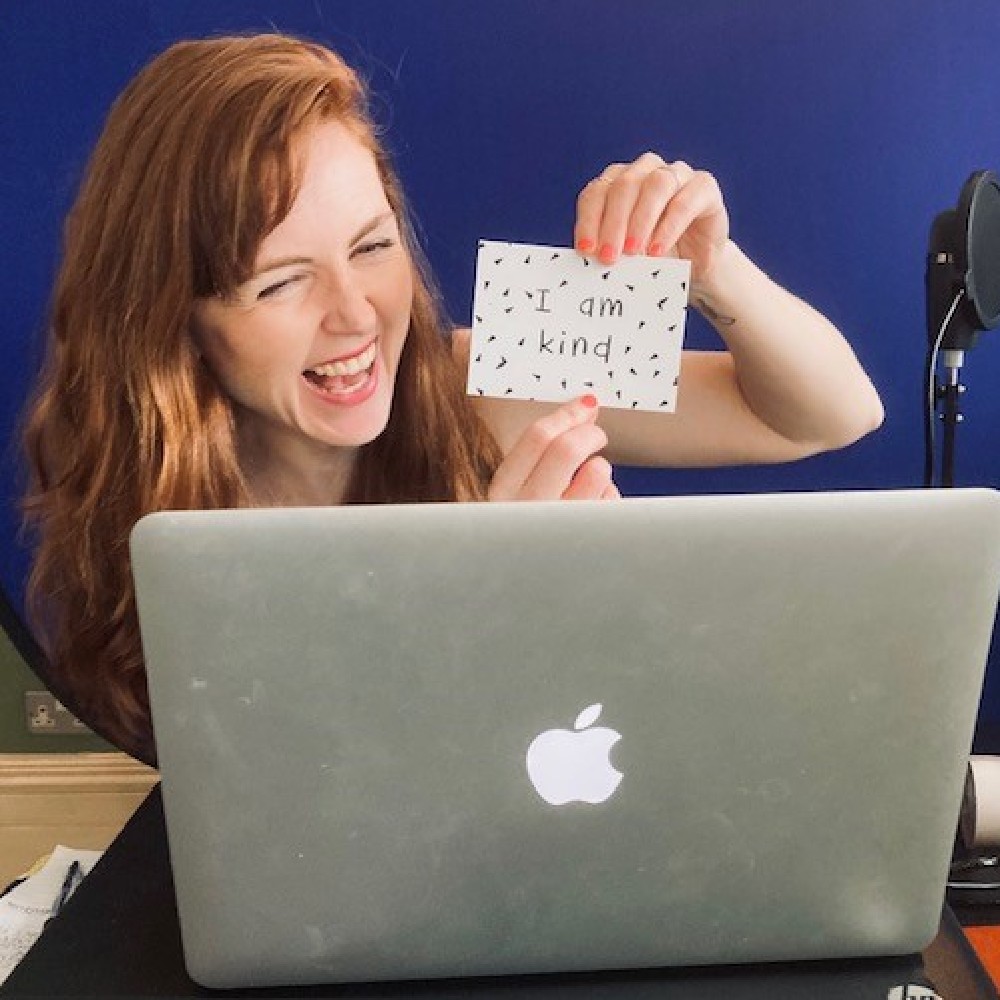As this week marks ‘Children's Mental Health Week 2022,’ we chat to Kerry about her and actor husband, Blake Harrison's, latest podcast ‘Your Floating Bed.’ The idea is to promote positive wellbeing and provide mindfulness techniques to help children with anxiety and mental health.

Your new podcast ‘Your Floating Bed’ is available to stream now – Can you tell us what we can expect?
‘Your Floating Bed’ is a collection of sleep journeys for families, to calm fizzy minds, promote positive wellbeing & gently guide you into happy dreams. During the first lockdown my husband and I were concerned about the effect the pandemic was having on our two children, Autumn aged 8 and Lorcan aged 4. We noticed how unsettled Autumn and Lorcan were particularly at bedtime, so we began introducing mindfulness techniques and making the practices more enjoyable for young minds. We combine simple guided meditation techniques with playful yet peaceful bedtime stories, and the children would imagine their bed floating away to a different destination every night. When we heard how many young people around the world were struggling with their sleep and wellbeing during these challenging times, we decided to create the podcast, where the mindful stories were not only shared with our young audience, but inspired by their destination requests. Listeners are encouraged to dive into their imagination and individuality and suggest where 'Your Floating Bed' goes on it's next journey. Suggestions have varied from exploring a Rainforest, or a trip to Hogwarts, and even a journey to a bowl of soup!
Your inspiration for the podcast developed from the pandemic - Why do you think it has played such a big part on mental health? Particularly children?
"I really hated seeing the effect the pandemic was having on children in our community and worldwide..."
The pandemic has created so much disruption, disappointment, uncertainty, worry, and chaos, the list goes on and on. It is unlike anything any of us have ever experienced. I really hated seeing the effect this was having on children in our community and worldwide. For example, the huge amount of disruption to their schooling and routine activities. Missing loved ones, friends, and experiencing loneliness which they have never had to deal with before. Concern and worry about the health of loved ones and those around them. Spending more time online, and exposure to online bullying and the negative impact of social media. All have a detrimental effect on our children’s mental health, and these effects are likely to last a long time. There has been a reported increase in behavioural and concentration problems in children too.
Why do you think bedtime increases anxiety?
Everyone is different, and experiences anxiety in different ways and at different times. I am someone that finds that at bedtime, as I begin to unwind, it can feel like I am buried under an avalanche of anxious thoughts and feelings. I believe it is because our tired minds can’t cope with these thoughts or reach for the tools to help and put these thoughts into perspective.
What mindfulness techniques can children use to help reduce anxiety?
The brilliant thing about mindfulness is that there are so many activities children can try to alleviate anxiety and to promote positive wellbeing. My advice would be to explore these different activities and find what resonates with your child and works best for them, whether it be journaling or meditation etc. ‘Your Floating Bed’ stories practice simple effective mindful techniques for children to use at bedtime or to carry with them through their day. We use a variety of breathing exercises, body scans, and the use of positive affirmations. These are tools I regularly use myself when I am faced with my own challenges.
The podcast is aimed at children but can parents/adults gain anything from tuning in?
Of course! I design our stories to be used by the whole family, because the practices are effective for anyone, no matter what age. I love hearing about families listening to them together. I actually received a lovely message at Christmas from a family on holiday in Lapland sharing one hotel room and listening to our ‘North Pole Adventure’ and drifting off to sleep together. That’s why I love making these stories.
Why would you encourage families to listen to the podcast?
I believe breathing and mindfulness are essential skills for children to make part of their regular routine. I didn’t discover mindfulness and make it part of my daily routine until I was in my 30’s. I really wish I’d been introduced to these practices as a child or teen. Children who practice mindfulness develop effective skills for coping with their emotions and experience improvements in their focus and attention. Through ‘Your Floating Bed’ we encourage the children to create a toolbox in their minds full of effective tools we can reach for whenever we are faced with challenges or just need a bit of calm.
And is it more effective at night-time?
"The brilliant thing about mindfulness is that there are so many activities children can try to alleviate anxiety and to promote positive wellbeing..."
I create a variety of ‘sleep’ and ‘calming’ journeys, however they can all be used whenever our listeners need or want them. The exercises are effective at any time of day, and I hope through the repetition of listening to our stories the children will learn to use the exercises automatically whenever they feel like they need them.
How important is it to talk about mental health with your children?
So important! Talking to our children about their thoughts and feelings can reduce any worry or confusion about how they are feeling. When we take the time to think about how we are feeling, and to talk about how we are feeling, it can help us to understand those feelings, and to express those feelings, to treat ourselves better, and to treat others better.
What tips can you give to parents who are struggling to broach the subject?
There are some extraordinary resources out there offering really helpful advice. Such as MentallyHealthyschool.org.uk, Mind Uk, YoungmindsUK, Place2Be amongst many others
Are there any signs that parents can look out for when it comes to anxiety and mental health?
Changes in your child’s behaviour, their sleep patterns, their interactions with others. I would recommend visiting the NHS website, Mind, YoungmindsUK, Place2Be for really valuable help and advice.
Do you have any plans to expand the podcast?
Yes we have been invited into primary schools to explore mindfulness with young people. As a result, we have created a workshop based on the podcast, and hope to continue to work with more schools and children’s charities. Our aim is to be of benefit to young people in as many ways as possible. We are so excited to see where this incredible journey leads us.

‘My Floating Bed’ Is available to stream now.
Tagged in children Kick Ass children's health Mental Health Podcast

